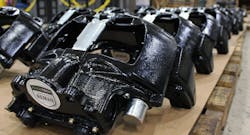Reasons fleets should consider reman
Remanufacturing – the process of turning a non-functioning used part, known as a core, into a high-quality finished product – is gaining momentum throughout the commercial vehicle industry. Proponents readily tout reman’s environmental attributes. The business case for fleets, manufacturers, and end users is just as compelling.
Overview of benefits
Remanufacturers have the advantage of knowing a product’s performance, allowing them to see design weaknesses that the original manufacturers could not predict. This knowledge allows remanufacturers to implement design and process improvements to solve specific issues and provide a product that is equal to or better than the original in quality, performance, and cost.
Examples are as simple as chrome plating parts that are prone to rust, using larger bearings to prevent a weak link in an assembly, or adding sensors for service alerts. To back this up, remanufacturers offer the same warranty on a remanufactured part as they do on a new original equipment (OE) genuine part. This process allows remanufacturers to offer products no longer in current production, and fleets enjoy a substantial discount to the new original – typically up to 40 percent.
Given the rapidly accelerating evolution of electronics and mechatronics in light duty and heavy duty vehicles, suppliers, original equipment manufacturers (OEMs), dealers, and distributors will encounter an increasing need to address product end-of-production inventory and service level requirements. Many business owners struggle with the risk of inflating their inventory with discontinued SKUs to satisfy possible future demand. Remanufacturing offers an alternative to minimize these last time buys, thereby reducing stagnant inventory levels, decreasing cash outlays, and improving long-term product lifecycle service levels.
Given the lower cost of remanufacturing compared to standard manufacturing processes, OEMs can significantly lower warranty costs by adopting a comprehensive remanufacturing strategy.
Going forward, OEMs and suppliers alike will need to adopt an integrated lifecycle management approach to their new product introductions that includes a design for remanufacturing discipline. This allows fleets to operate their vehicles longer and more efficiently while keeping employees focused and trained on the core business of servicing customers.
Benefits beyond the business
Beyond product benefits, jobs, energy, and waste savings related to remanufacturing are substantial and measurable.
For example, one air disc brake (ADB) manufacturer recently announced over 40 million of their ADB calipers are on the road worldwide currently. The amount of energy used to create those potential ADB cores is equivalent to powering 1.5 million U.S. homes for one year. A fuel injector remanufacturer in Chicago advertises that its process on one product line saves enough energy to power 50,000 U.S. homes for one year.
Additionally, remanufacturing renews the life of a core several times before it ends up in a landfill or a recycling station. Likewise, fleets that prioritize remanufactured products can quantify their positive contribution to the environment and, as a result, private and public sectors globally are starting to see this link and are working on legislation to encourage the trend.
Technological advancements in 3D printing, additive and surface treatment technologies, and reverse engineering technologies will allow remanufacturers to reuse an increasing percentage of the core, giving remanufacturers a competitive edge when taking advantage of the new tools available. As fleets demand more remanufactured products, technology will evolve to add more value to an already valuable product.
Quality and reliability will always reign supreme. That’s why remanufactured products must be, at minimum, on par in quality and performance with new products to offer the maximum benefits to fleets, the companies that produce them, and the environment.
According to the Remanufacturing Industries Council, remanufacturing can save 85 percent of energy, water, and material use compared to a newly manufactured product. And the trend has lead John Chalifoux, president of MERA – the Association for Sustainable Manufacturing, to recently suggest an update to the 3 Rs of the environment to now say “Reduce. Reuse. Reman. Recycle.”
For a fleet, remanufactured products offer a solution that is equal to or better than new at a substantial cost savings. Additionally, fleets save resources when buying a ready-assembled remanufactured product versus repairing in-house. Fleets can help support remanufacturing by demanding MERA-certified remanufactured products from reputable sources while also helping a smooth flow of cores back to their suppliers.
For the last 40 years, AxleTech has remanufactured its axles and transfer cases for the off-highway and defense markets, and recently launched an air disc brake (ADB) caliper remanufacturing product line, as well as electronics and mechatronics remanufacturing capabilities based on the expected exponential growth of electronics content in vehicles in the next five years. Through the AxleTech Certified Reman program, the company can deliver factory-like heavy equipment transporter axles, lift truck axles, transit bus drive axles, transfer cases, and electronics/mechatronics. El-Kassouf is responsible for leading the global business development effort for the remanufacturing business segment. He is a 27-year veteran in the commercial vehicle industry. Prior to re-joining AxleTech, he served as General Manager of AXN Heavy Duty as well as positions with increasing responsibility in off-highway axle product application, design and development, aftermarket operations management, business development, and strategy implementation at AxleTech.
About the Author

Raji El-Kassouf
Director, Remanufacturing Business Development
Raji El-Kassouf is the Director of Business Development, Remanufacturing for AxleTech.
